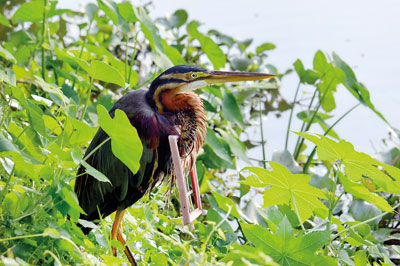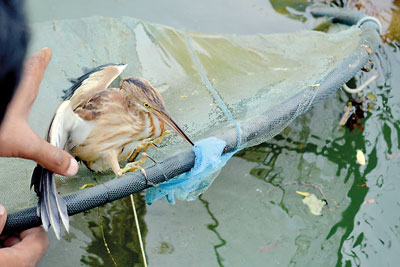News
Don’t trash nature’s gifts, wildlife experts plead
View(s):By Malaka Rodrigo

Birds; victims of careless garbage dumping by us humans. Pix by Sumith Bandara
Reckless disposal of garbage in our localities can put precious bird life in peril as two recent incidents showed.Wildlife specialists are appealing to Sri Lankans to be a lot more considerate after rescuing two species of bird that endured the horrors of human encroachment of their habitat.
Herpetologist and wildlife photographer Mendis Wickramasinghe and two assistants Sumith Bandara and Saman waited until dusk last Sunday to go to the aid of a purple heron (karawal koka), which often feeds on fish in marshes and paddy fields, struggling to free its beak tangled in a plastic contraption.
Photos of its plight at Boralasgamuwa tank, caught the attention of social media users and drew the usual chatter.
Wickramasinghe and his aides freed the blue heron from its misery. They then checked for possible wounds and released the bird. The following morning they visited the location to give it a meal of fish, but the blue heron had other ideas and flew off to feed itself.Bandara said it was a happy outcome, but he pleaded with Sri Lankans to abandon destructive habits. “People need to be more careful when dumping waste,” he said.
But then two days later, he had to rescue another bird from similar circumstances.Being a keen wildlife photographer, Bandara again visited the Boralasgamuwa tank on Wednesday evening. He soon saw a yellow bittern (kaha metikoka) with its beak entangled in a net. Bandara noticed it was a discarded mosquito net.
As dusk approached Bandara and friend Amila Ranga waded into deep water and released the bird from the net. It was a risky exercise. The exhausted bird appeared disoriented and stood by for a few minutes before taking flight.Bandara also noted that strings used for kite flying have also become death traps for birds.


